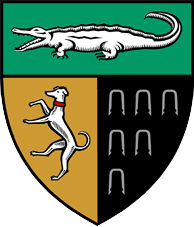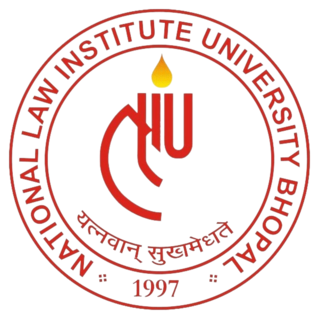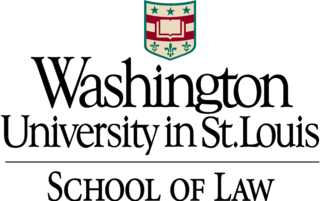
Yale Law School is the law school of Yale University, located in New Haven, Connecticut. Established in 1824, it has been the top-ranked law school in the United States by U.S. News and World Report every year since the magazine began publishing law school rankings in the 1980s.

The Georgetown University Law Center, often known as Georgetown Law, is one of the professional graduate schools of Georgetown University in Washington, D.C. Established in 1870, it is the second-largest law school in the United States, by enrollment, and receives more full-time applications than any other law school in the country.

Moot court is a co-curricular activity at many law schools. Participants take part in simulated court or arbitration proceedings, usually involving drafting memorials or memoranda and participating in oral argument. In most countries, the phrase "moot court" may be shortened to simply "moot" or "mooting". Participants are either referred to as "mooters" or, less conventionally, "mooties".

The West Bengal National University of Juridical Sciences is one of India's finest National Law Universites. Established in 1999, NUJS offers courses at under and postgraduate levels. It is in Salt Lake City of Kolkata, West Bengal, India.

The Hague Academy of International Law is a center for high-level education in both public and private international law housed in the Peace Palace in The Hague, Netherlands. Courses are taught in English and French and, except for External Programme Courses, are held in the Peace Palace.

National Law University, Jodhpur (NLUJ) is a public law school and a National Law University established under the National Law University, Jodhpur, Act, 1999 enacted by the Rajasthan State Legislature. The University is established for the advancement of learning, teaching, research and diffusion of knowledge in the field of law. It is one of the autonomous law schools in India.

UIC John Marshall Law School is a public law school in Chicago, Illinois. It was founded in 1899 and initially accredited by the American Bar Association in 1951. The school was named for the influential nineteenth-century U.S. Supreme Court Chief Justice John Marshall. It merged with the University of Illinois at Chicago on August 16, 2019, according to a plan announced by both schools in 2018.

National Law Institute University (NLIU) is a public law school and a National Law University located in Bhopal, India. Established in 1997 by the State of Madhya Pradesh, it is one of the first three law schools to have been established under the National Law School system. The university launched its first academic programme in 1998, with Indian jurist V.S. Rekhi as the Director. Recognised by the Bar Council of India, the university admits 100 undergraduates each year through the Common Law Admission Test, who complete 15 trimesters before being awarded a combined B.A., LL.B (Hons.) degree. The post-graduate course offered at the University is the LL.M. degree.

Washington University in St. Louis School of Law (WashULaw) is the law school of Washington University in St. Louis, a private university in St. Louis, Missouri. Founded in 1867, WashULaw is the second oldest law school west of the Mississippi River. The older Saint Louis University School of Law was founded in 1843. WashULaw is consistently ranked in the top 20 law schools in the country; it is currently ranked 17th among the 198 American Bar Association-approved law schools by U.S. News & World Report. Originally, the law school was located in downtown St. Louis, but it relocated in 1904 to the Danforth Campus of Washington University in St. Louis, and is housed in Anheuser-Busch Hall.
Auckland Law School is one of the eight faculties that make up the University of Auckland. The Faculty of Law is located at the City Campus, between Waterloo Quadrant and Eden Crescent. It is in close proximity to the Auckland High Court. In 2020, Auckland Law School ranked 50th in the world and best in New Zealand on QS World University Rankings. The University of Auckland’s Faculty of Law is the largest of its kind in New Zealand. It boasts experts in a variety of fields, including commercial, public, human rights and environmental law.

The Faculty of Law, University of Delhi is the law school of the University of Delhi, a central university established by an Act of Parliament and under the direct purview of the Department of Higher Education (DHE) under Ministry of Human Resource Development (MHRD).

The Robson Hall Faculty of Law is the law school of the University of Manitoba in Winnipeg, Manitoba, Canada. It is located on the Fort Garry campus.

The Dundee Law School is the law school of the University of Dundee in Scotland. It provides undergraduate and postgraduate teaching in Scots and English law, permitting students to qualify into all three United Kingdom legal jurisdictions. The school is based in the Scrymgeour Building—named for Henry Scrymgeour, a 16th-century legal philosopher from Dundee—while the Law Library is based in the libraries building, both on the university's main campus. The Law School is part of the wider School of Social Sciences at Dundee.
The Faculty of Law is a faculty of the University of Windsor in Windsor, Ontario, Canada. The first class of students matriculated in 1968, and the current building was opened in 1970. The Faculty has grown immensely over the past 50 years, increasing its national profile through its innovations in research and from thousands of alumni across Canada and the world. The 2017 endowment to the Faculty of Law was $10.2 million. The Faculty is also the current academic host institution of the Canadian Bar Review (CBR), the most frequently cited journal by the Supreme Court of Canada. In 2018, the Faculty of Law was ranked the 5th best law school in Canada by Canadian Universities magazine.

A legal clinic is a legal aid or law school program providing services to various clients and often hands-on-legal experience to law school students. Clinics are usually directed by clinical professors. Legal clinics typically do pro bono work in a particular area, providing free legal services to clients.

The Faculty of Law of the University in Belgrade, also known as the Belgrade Law School, is one of the first-tier educational institutions of the University of Belgrade, Serbia. The building is located in the heart of the old part of Belgrade, in the urban neighborhood of Palilula, contiguously to the city park Tasmajdan, on Bulevar kralja Aleksandra.
The University of Pretoria Faculty of Law was established in 1908 and consists of five academic departments, six centres, two law clinics and its own publisher the Pretoria University Law Press (PULP). This faculty ranks best in Africa and 76th in the world with leading Departments of Jurisprudence; Mercantile Law; Private Law; Procedural Law; Public Law; and Centre for Human Rights. The faculty offers the undergraduate LLB degree, the postgraduate LLM and LLD degrees as well as several continuing education courses.

The Whitney R. Harris World Law Institute at Washington University School of Law, established in 2000 as the Institute for Global Legal Studies, serves as a center for instruction and research in international and comparative law.

Penn State Law, located in University Park, Pennsylvania, is one of two separately accredited law schools of the Pennsylvania State University. Penn State Law offers J.D., LL.M., and S.J.D. degrees. The school also offers a joint J.D./M.B.A. with the Smeal College of Business, a joint JD-MIA degree with the School of International Affairs, which is also located in the Lewis Katz Building, as well as joint degrees with other graduate programs at Penn State.















